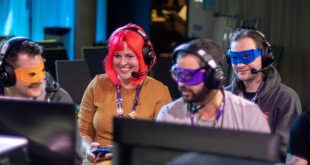Every month an industry leader wraps up MCV/DEVELOP with their unique insight. This month, we talk to Sally Blake, CEO of Silent Games.
A 2022 Women In Games Award finalist, Sally Blake is the co-founder and CEO of developer Silent Games and the co-founder of Women Making Games. A ten-year veteran of the UK games industry, she has held senior production roles at Reflections, Dimension and No More Robots.
What has been a memorable highlight of your career to date?
Thankfully, there have been many memorable highlights! Of course, co-founding Silent Games is a huge one, we really started with nothing and now our team is 18 people who are all incredibly talented and hardworking. Signing the deal with Amplifier Game Invest that allowed us to make the game we’ve always wanted to make was a huge highlight – I’ve wanted to run my own game studio since I was a little girl and the fact it’s finally a reality is something I’m immensely proud of! Another big highlight was attending E3 to showcase The Division – I met some really enthusiastic players and it was surreal to be there after years of watching it at home with my little brothers. Lastly – any game launch is just such a wonderful feeling, I remember seeing adverts on the side of a bus, the boxes on the shelf in the store, huge posters in train stations, and everything promoted on the online stores. Nothing matches launch day – the stress, relief and joy to see all your hard work come to fruition is unparalleled.
What would you say was your greatest achievement?
Building a studio from scratch and getting funding over a pandemic feels like a big achievement! But I didn’t do any of it alone, our co-founder Joseph Rogers worked tirelessly on the game concept and we had the unwavering support of friends and family who genuinely and sincerely believed in us from the beginning. There were people we knew who were certain we’d make it, they really had no doubt, which meant the world to me at the time especially when I was working in multiple roles while trying to build the studio at the same time. Shout out to No More Robots who were excellent to work for and helped me learn a great deal about the word of publishing while I was there, they were very supportive throughout.
What ambitions do you have for the future?
We have our first game coming out in the future which I am ridiculously excited about, of course! I am very excited for the day we get to announce it and share what we’ve been working on. I grew up with games and I know how impactful they can be for players, not just entertainment-wise. I’ve played some games that have changed the course of my life for the better and have provided a much-needed escape in difficult times. I would be so happy if our games provide that comfort and joy to someone, and food for thought too. As for the industry as a whole, I am hoping that we see more transparency and dialogue between developers and players – personally, I see myself as a player first, and having conversations with other players about their feedback and ideas is something I’ve always really enjoyed and I want us to be able to do more of that in future as an industry. Game development is becoming less and less of a mystery (for better or worse) but ultimately, I feel if we all have a better dialogue with players, we will make better games.
What have been the most notable industry changes over the years that have impacted you professionally?
There have been so many big changes in the game industry over my lifetime such as the introduction of the internet and online gaming, the rise of social media and also the fact there is a whole industry around streaming and esports. I can go online and see someone playing games I’ve worked on and see their opinions, thoughts, and gameplay in real-time. I always laugh when I read a YouTube comment that is like ‘well the devs will never see this anyway’ and I’m there reading it. You have to develop a thick skin for that sometimes! I can see how people will feel negatively about that but for me, critical feedback is something we can learn from, even if you can’t always please everyone. I just want to make good games and the more tools for that at our disposal the better.
What do you see as the gaming industry’s biggest challenges in the years ahead? Will it be able to overcome them?
One of the things that was quite challenging for us, and I have heard many founders say the same, is that there is quite a large gap in early funding/prototype funding for games specifically. If you don’t have any financial backing to start with, it can be quite hard to get the money together to create a prototype for your pitch and that is a necessary component most of the time. There have been some promising developments for alleviating this recently and the UK Games Fund was very helpful to us in this regard, so I hope to see more initiatives in the future to assist. Secondly, the way mainstream media talks about games sometimes seems to still project a tone that games are a quirky novelty rather than a huge industry that is creating hundreds of highly specialised jobs in the UK, so I’d hope that changes moving forward as more people recognise the industry for what it really is.
Do you think the industry is in a healthy place – or headed in the right direction, at least?
Yup. The game industry is absolutely thriving right now. As mentioned, I see a lot more information about it in mainstream media, I do think people are finally realising how massive the game industry is both culturally and financially. Also, there have been a lot of positive changes company and culture-wise and people are a lot more able to speak freely about issues they are facing. There is still room for improvement and development but I’ve seen a lot of positive changes in the last ten years and I hope to continue seeing an upward trend.

 MCV/DEVELOP News, events, research and jobs from the games industry
MCV/DEVELOP News, events, research and jobs from the games industry




